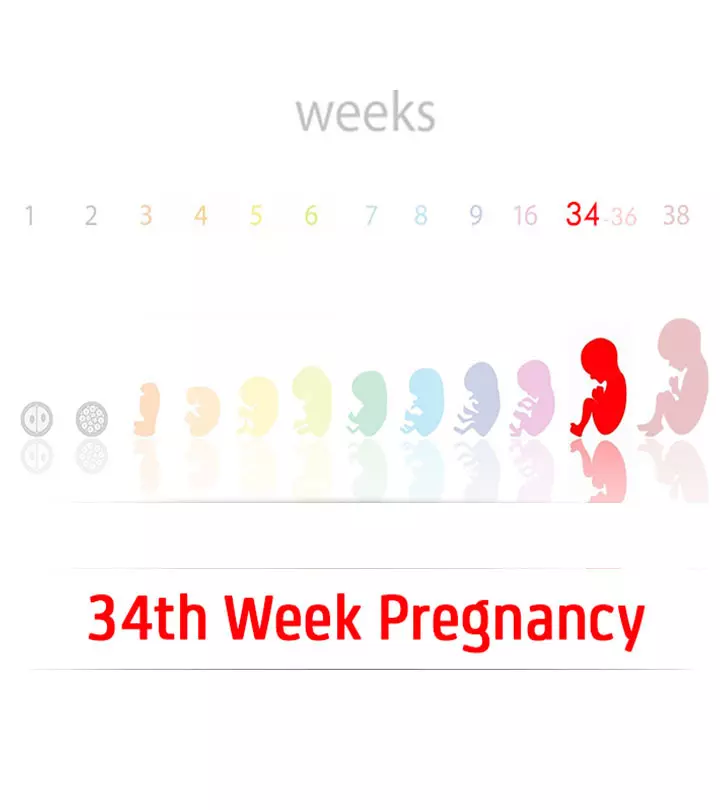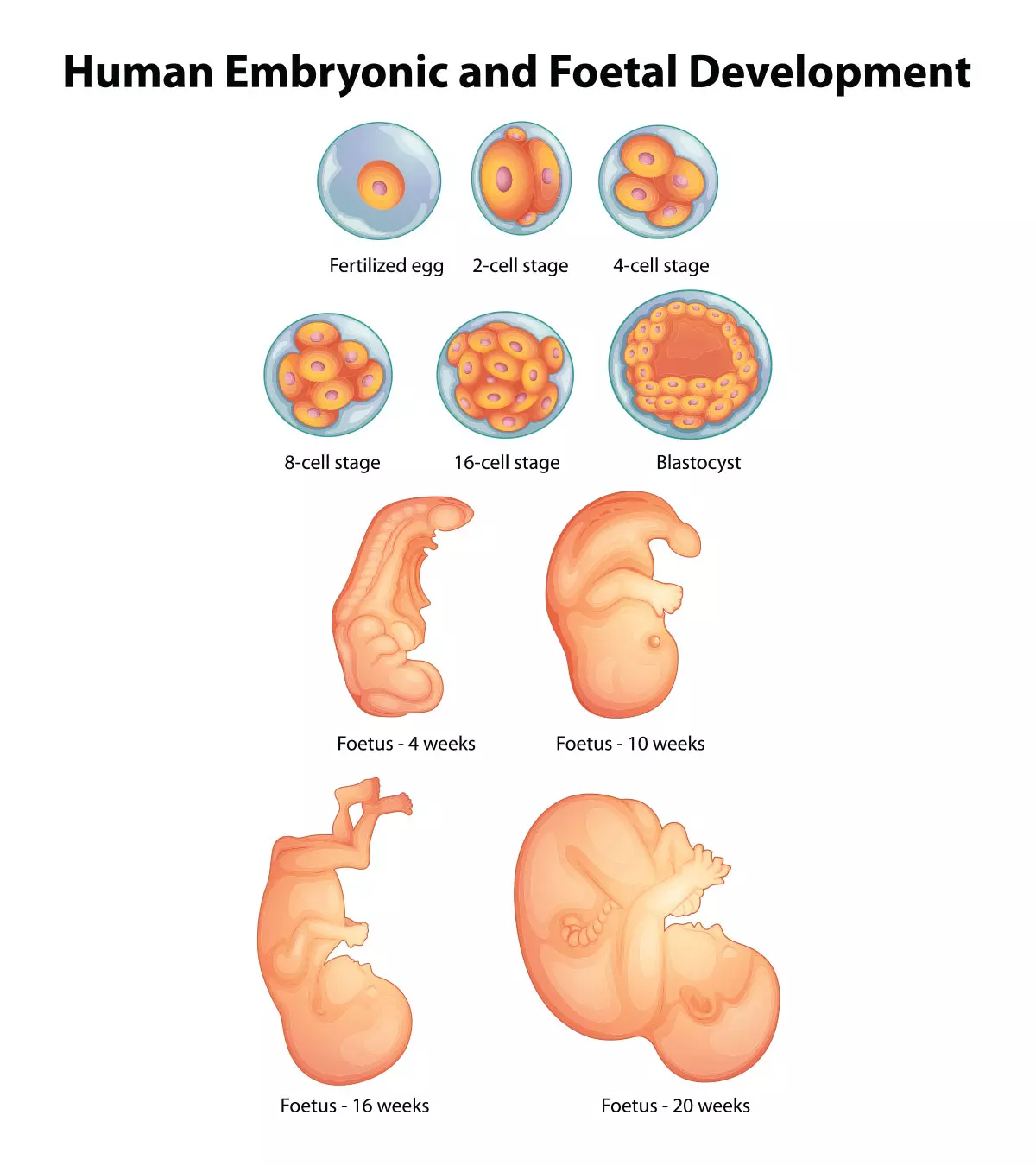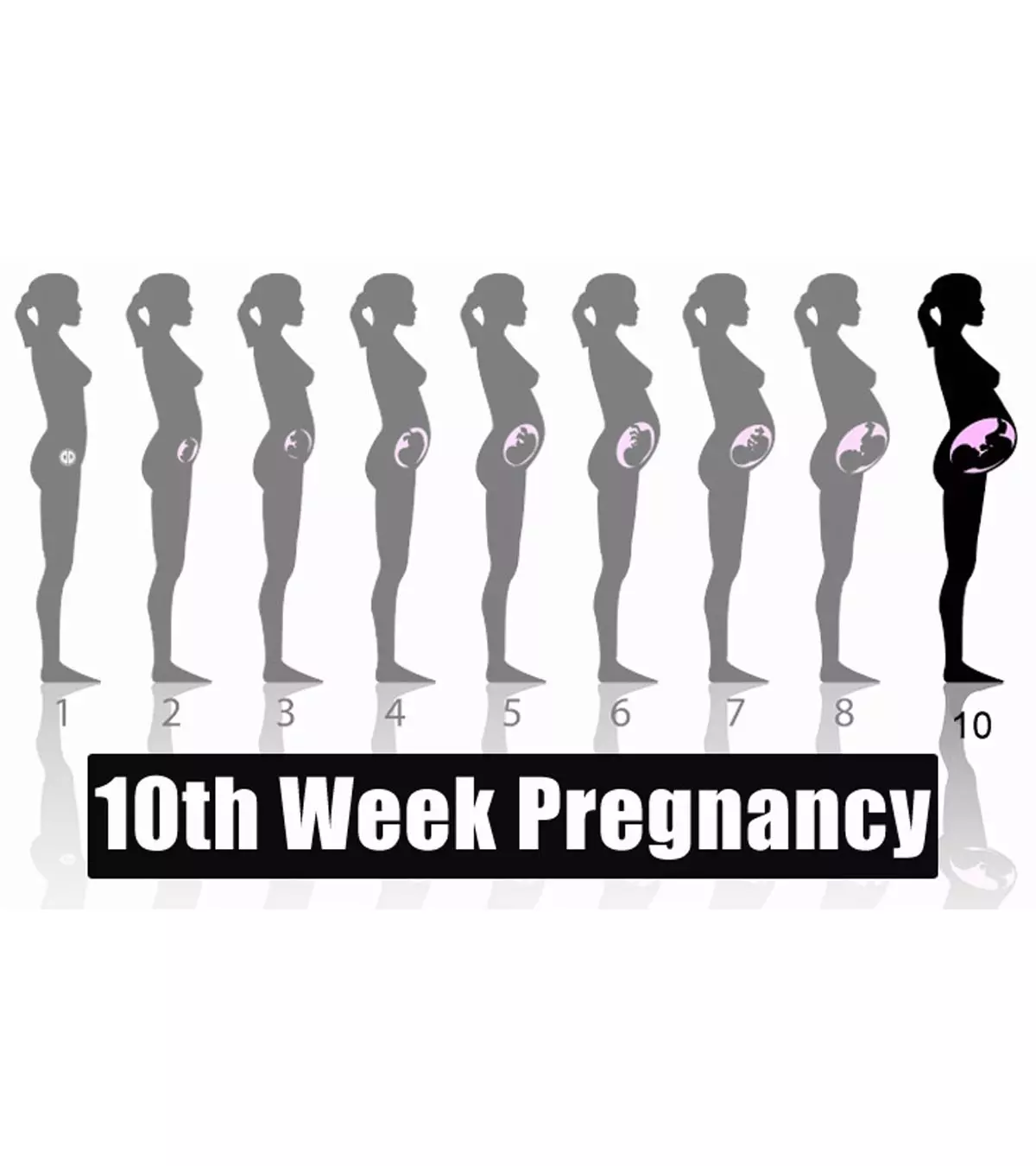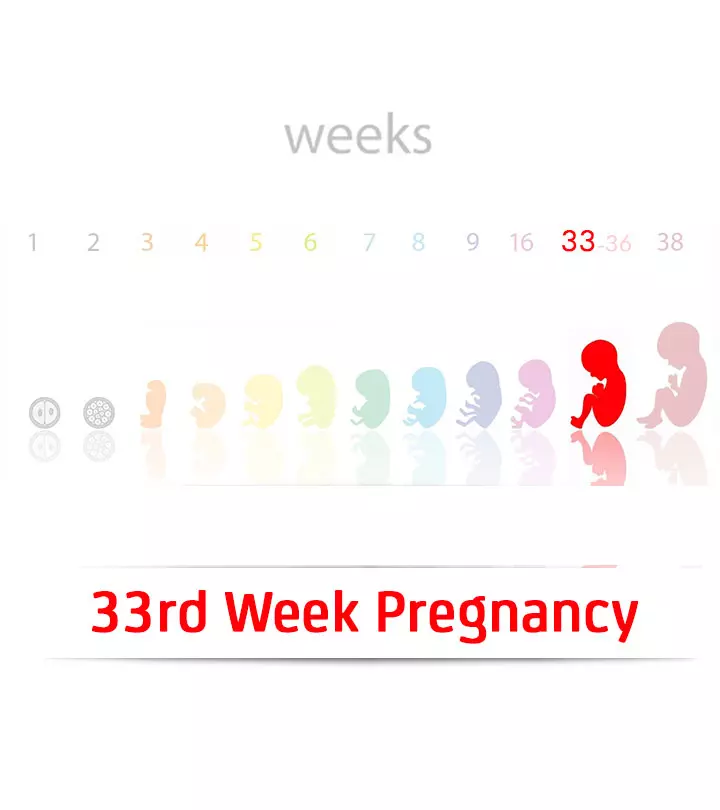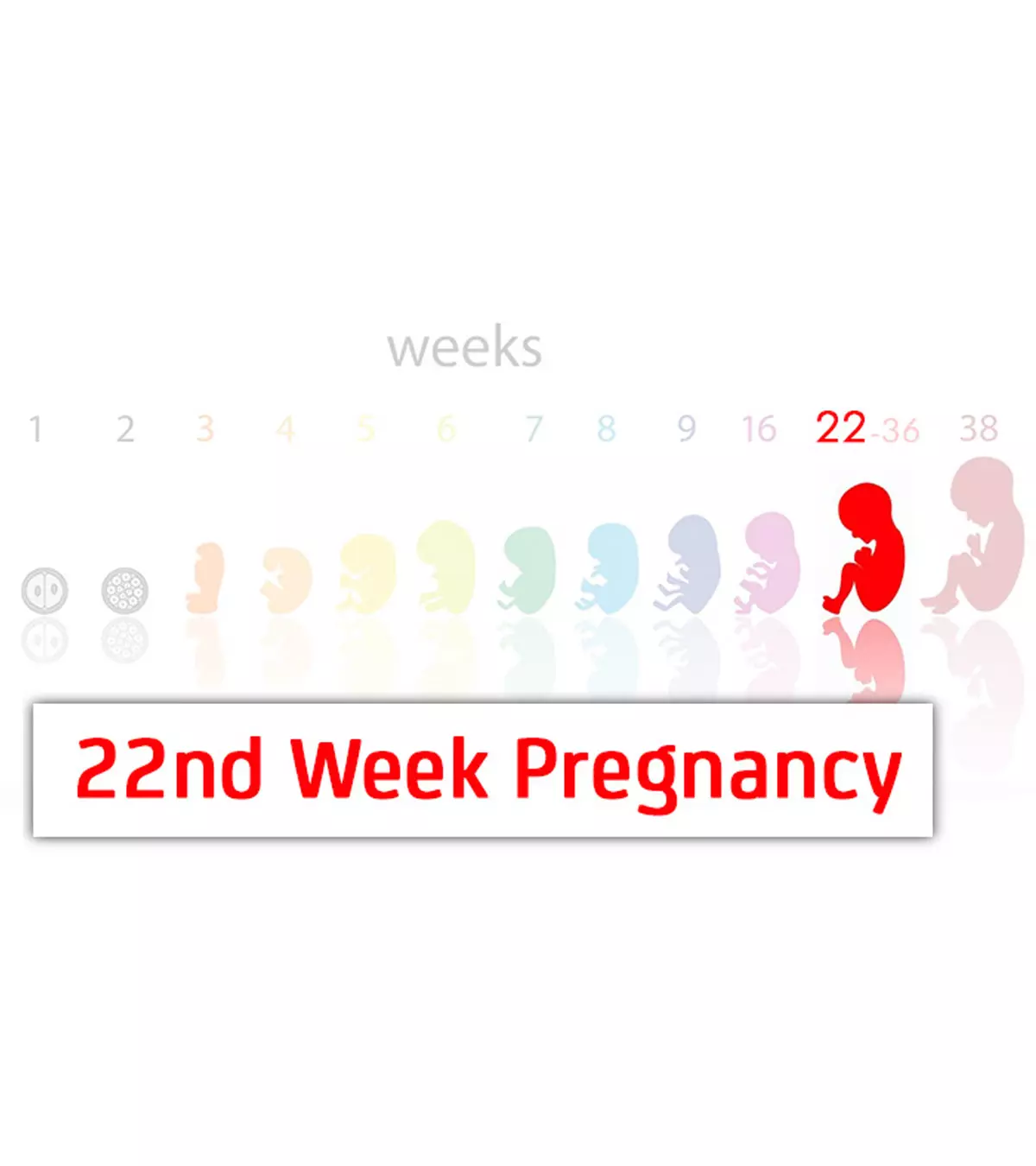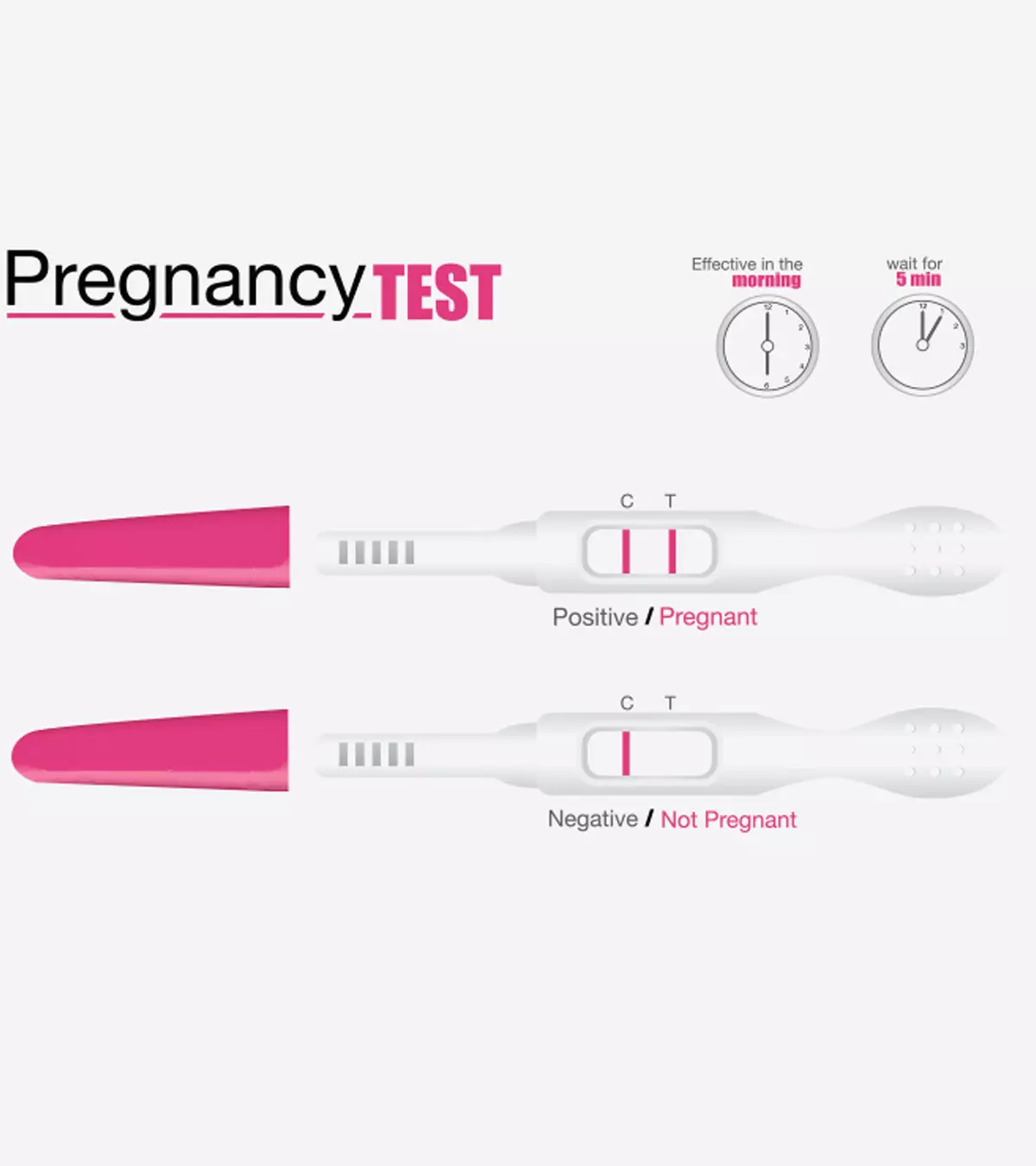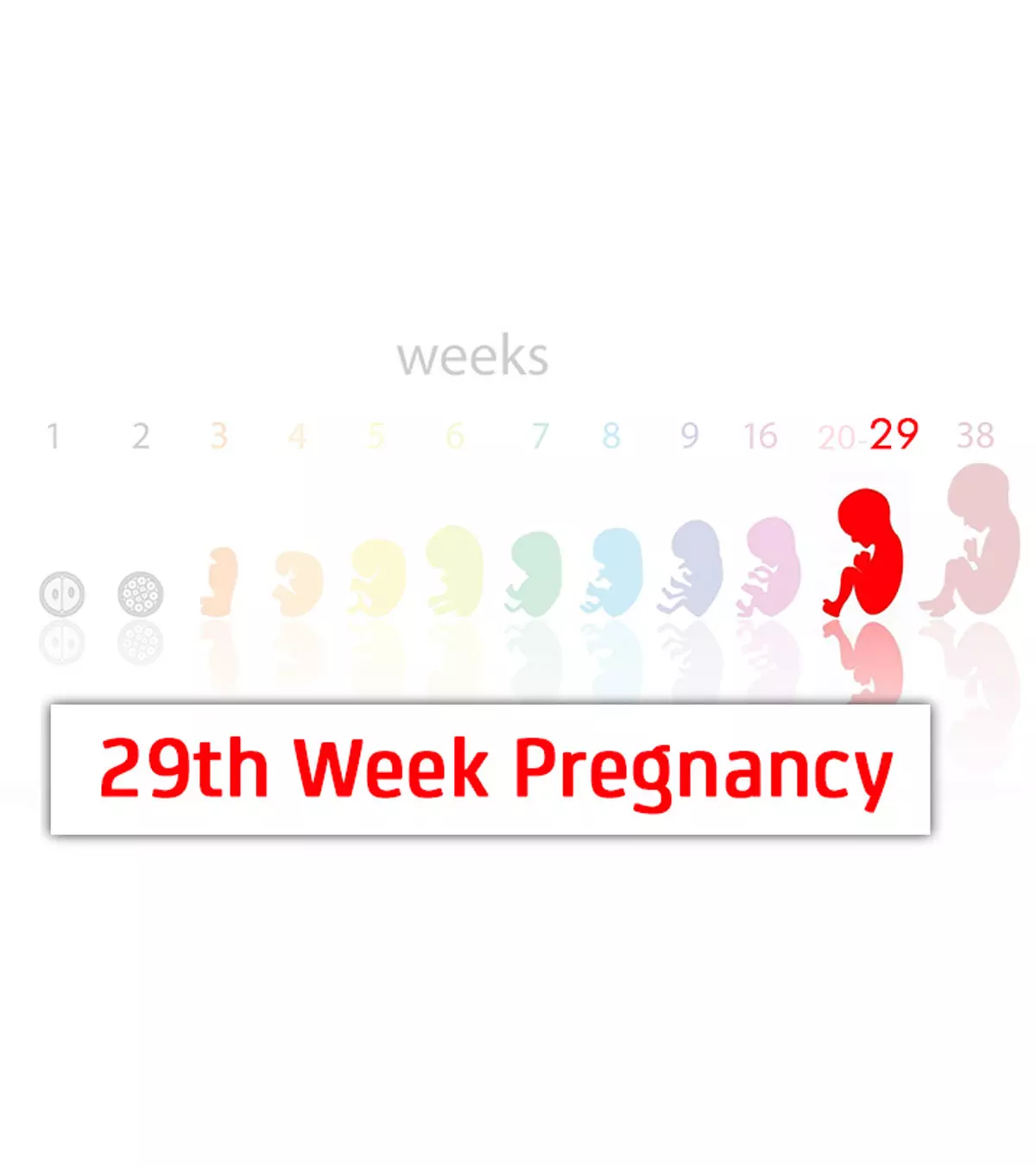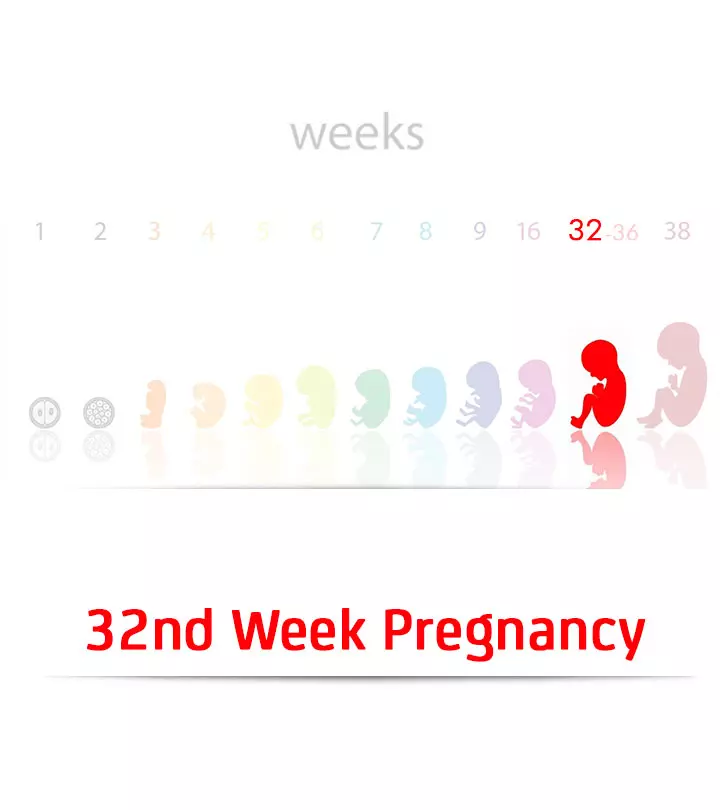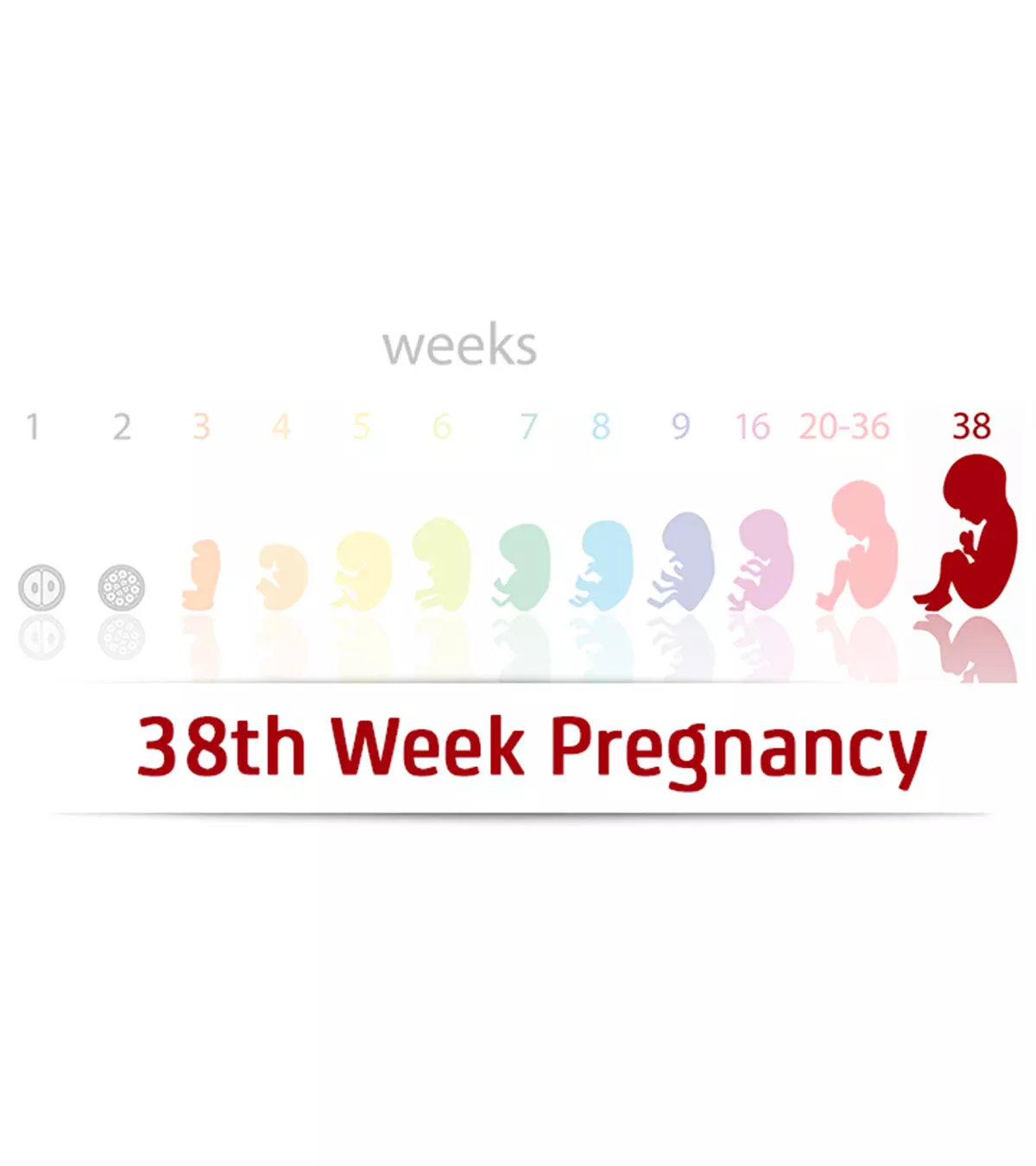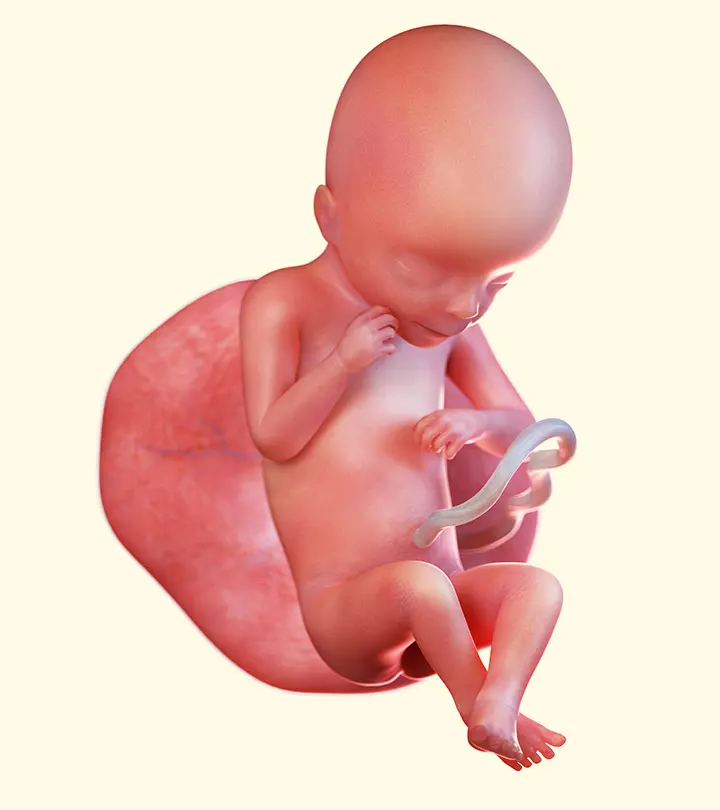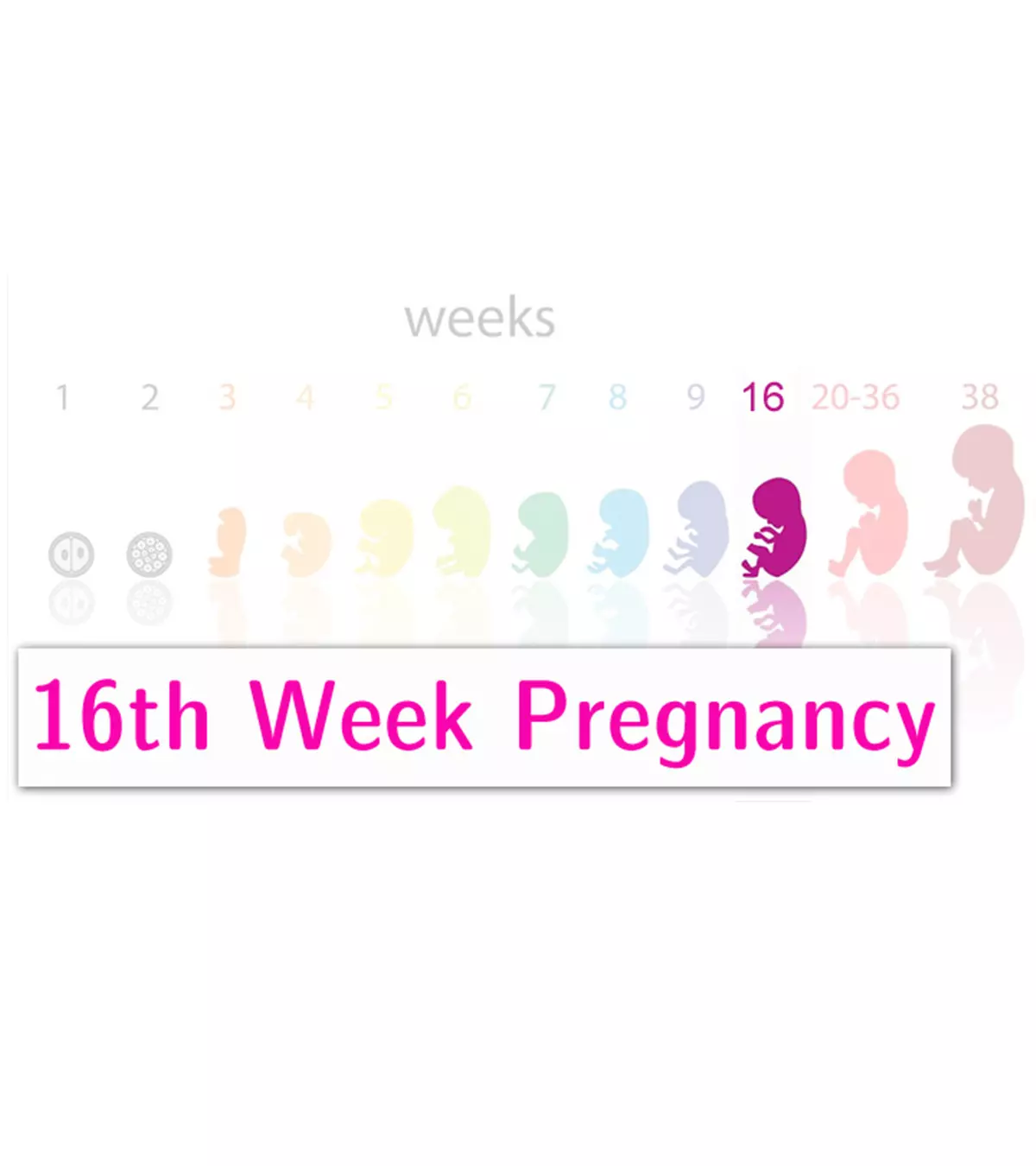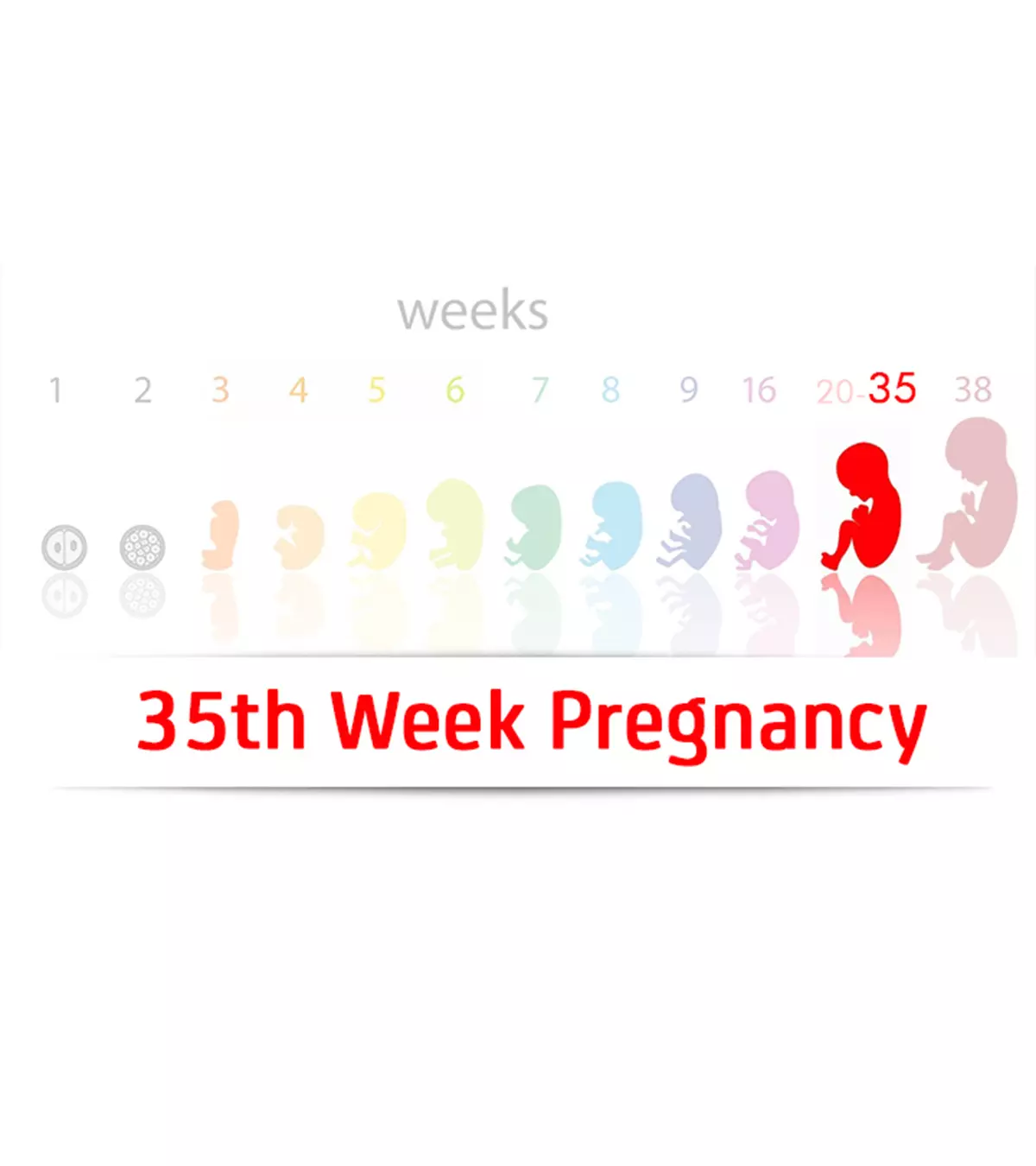
Image: Shutterstock
Key Pointers
- At 35 weeks, a pregnant woman is in her 8th month and the final trimester.
- The baby measures 46.2cm and weighs 2.383kg, which is similar to the size of a honeydew melon.
- The baby’s skin has fewer wrinkles, bones are fully formed, heart and blood vessels are complete, brain development is accelerating, and lungs are nearly developed.
- Symptoms during the 35th week of pregnancy may include fatigue, shortness of breath, frequent urination, heartburn, swelling, and back pain.
- Physical changes for pregnant women during this week include an enlarged belly, tender and sensitive breasts, and visible stretch marks.
How Many Months Pregnant Are You At 35 Weeks?
At 35 weeks, you are in the eighth month and third trimester of pregnancy. In two weeks, your pregnancy will be considered full-term.
How Big Is Your Baby At 35 Weeks?
Babies in this week are said to be about the size of a honeydew melon (1).
On average, a baby measures 18.19in (46.2cm) in length and weighs 5.25lb (2.383kg) (2). By this time, the baby’s development is almost complete.
Baby Development At 35 Weeks
The following section tells you about the general fetal development this week:
| Body organs | Development |
|---|---|
| Skin (3) | Less wrinkled, as fat gets deposited under the skin |
| Bones | Fully developed |
| Heart and blood vessels | Completely developed |
| Brain (4) | Developing faster than before |
| Lungs (5) | Almost developed and are creating surfactants |
| Genitals (1) | In boys, testicles descend from uterus to scrotum |
| Nails (5) | Toenails and fingernails extend to the tips of the toes and fingers |
| Lanugo (6) | The fine, downy hair has almost been shed off from the body |
The baby also develops a specific sleep pattern by this week and is bigger than before, leaving little space for movement inside the uterus.
Fetal position and movement: The baby attains the head-down position (vertex position) this week, and is curled up in the uterus with legs bent up towards the chest. Though there is little room for the fetus to move inside the womb, it changes its position in slow movements that you can feel.
Even if the baby is in a breech position, there is still time for the baby to move to an optimal position.
Read more about the symptoms you will experience this week.
What Symptoms Do You Have In The 35th Week Of Pregnancy?
Here are a few symptoms that pregnant women are likely to have during this week:
- You are likely to feel more tired and fatigued now than before as you are carrying an almost full-term baby.
- The growing belly puts pressure on the diaphragm, resulting in shortness of breath.
- The enlarged uterus puts pressure on the bladder, increasing the frequency of urination.
- The enlarged belly might potentially impact your sleep and cause sleep deprivation and other sleep-related problems.
Discussing her sleep troubles during the 35th week of her pregnancy, a mother and blogger, Selma, reveals, “Apart from my exploding belly, the other reason I think the baby has been preparing for life outside the womb with some extra inches and fat reserve is that I have been feeling more tired this week. Eight hours of sleep just don’t seem to do the trick anymore!
“Despite this, sleep has been hit and miss. On some days, I fall asleep as soon as I hit the pillow, only to wake up after eight hours of deep sleep; on others, I keep thinking and thinking, or, worse – I wake up at 4 a.m., finding myself unable to get back to sleep. I guess it’s all normal third-trimester stuff (i).”
- The enlarged uterus pushes the gastric acids upward into the esophagus, causing heartburn.
- The water retention in the body causes edema, which is swelling of the hand, foot, and face.
- The pressure put by the uterus on the rectal veins causes hemorrhoids, which is the swelling of the blood vessels in that area.
- The extra weight of the fetus puts more pressure on the lower back, causing a backache.
- Progesterone hormone slows down the digestion process, leading to constipation.
- Braxton Hicks contractions are the irregular and less painful contractions that help the body prepare for labor.
- Your water may break, and a gush of vaginal fluid may occur indicating that delivery is imminent.
- The hormonal fluctuations can lead to occasional headaches.

- The extra blood flow to the lower part of the body can cause swelling of the blood vessels in the leg area, resulting in varicose veins.
- The hormonal fluctuations can result in loosening and bleeding of the gums.
- The growing uterus causes a shift in the center of the gravity in your body, making you clumsy at times.
- The hormonal changes increase your tendency of forgetfulness, which is quite common during this week.
As the baby grows, you will also experience physical and emotional changes at this time.
 Point to consider
Point to considerChanges In The Body In The 35th Week
Some women are likely to have these changes during this week.
Physical changes
- A prominent baby bump with a protruding navel
- Tender and sore breasts
- Colostrum, a watery and milky fluid starts leaking from your breasts
- Bigger and darker areola and nipples
- Dark green or blue veins are visible around the breast and other parts of the body due to the increased blood flow
- Darker linea nigra
- Stretch marks

Emotional changes
- Anxiety
- Mood swings
- Fear and stress of labor and delivery
The 35th week is close to the home stretch period and could result in preterm delivery in some cases. Next, we tell you how to identify that.
 Did you know?
Did you know?Preterm Labor In The 35th Week
Labor occurring before 37 weeks of gestation is considered preterm. The following are some signs of preterm labor (7):
- Experiencing five or more contractions in one hour
- Water leak from the vagina
- Abdominal pain during pregnancy with or without diarrhea
- Pelvic cramping similar to that of menstrual cramps

- Pelvic pressure
- Lower backache that is constant or intermittent
- Vaginal discharge with a pink tint or streaks of blood
If you experience any of these symptoms, call for medical help. In the meantime, here is what you can do.
Tips To Deal With Preterm Labor
Here are some tips to evaluate the symptoms and find out whether or not you are really in labor.
- Contractions: As soon as you start feeling the contractions, walk around or lie down on your left side and see if they get stronger and frequent. Make a note of the number of contractions you experience as it can help the doctor gauge how the labor is progressing. You may be given certain medication to stop the contractions if there are no pregnancy complications.
- Water break: Water breaking is indicated by the release of amniotic fluid (fluid protecting the fetus) from your vagina. Therefore, if you experience a continuous, watery discharge, then use a sanitary napkin or pad to prevent any infection and head to the hospital immediately. Once the water breaks, you will be predisposed to catch infections that may affect both you and your baby. Your obstetrician may put you on intravenous antibiotics to prevent any serious infections.
- Bleeding: If you notice vaginal bleeding, use a sanitary pad to contain it. Go to the hospital as soon as you can, so that the doctor can check for any internal reasons for bleeding.
- Pelvic or back pain: Get a gentle massage done by your partner. You can also use a warm compress for relief. If the pain persists, then contact your doctor. They will check if you are in labor.
If you notice any other unusual symptoms, then reach out to your obstetrician at the earliest.
When To Call The Doctor
- You notice any significant change in your baby’s movement.
- Have a sudden weight gain, swelling of hands and face, blurred vision, persistent headache, breathlessness, lightheadedness and abdominal pain.
- The color of the urine is dark yellow or orange, with or without odor and is accompanied by an abdominal or lower back pain. A burning sensation or vaginal itching during pregnancy might indicate UTI.
- Extreme thirst and dry mouth, accompanied by blurred vision, fatigue, dizziness.
- Unilateral swelling with or without pain, along with tenderness in the leg.
Usually, babies born between 34 and 37 weeks pregnancy are considered as late preterm infants or near-term infants. While they generally do well, some may require close monitoring for a few days compared to full-term babies, as they are slightly more prone to respiratory difficulties, jaundice, and infection (8). As per the National Center for Health Statistics, 10.49% of babies were born preterm in 2021.
If the symptoms are normal and there is no indication of preterm labor or other complications, schedule the usual weekly OB/GYN visit.
Your OB/GYN Visit
Your appointment with the doctor this week would ideally include:
- Weight check
- Blood pressure
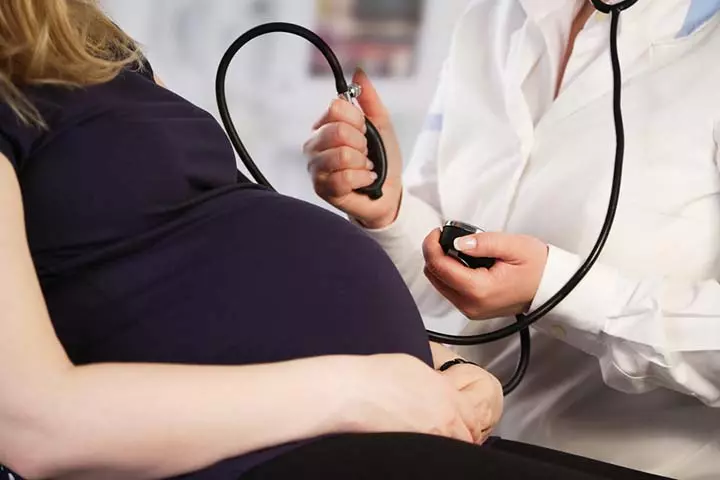
- Fundal height
- Ultrasound, to check the position and health of the baby.
- Group B strep test; the screening test of the vaginal swab checks for group B Streptococcus (GBS) infection. If GBS is detected, antibiotics will be given to reduce any risk of infection to the baby (9).
If the pregnancy is progressing smoothly, continue to take care of yourself until the baby is ready to come out.
Tips For Mom-to-be
- Always get up slowly from the lying position to avoid any jerky movements.
- Taking a warm bath eases the discomfort caused by leg cramps, hemorrhoids, and back pain.
- Avoid carbonated drinks, spicy and citrus foods in the case of heartburn.
- Eat healthy and home-cooked meals.
- Walking will help you feel energetic and have a good night’s sleep.
- Stay hydrated but drink less water at least one hour before going to bed. This reduces the urge to urinate during the night and ensures an undisturbed sleep.
- Wear loose and comfortable maternity clothes.
- Get a massage from a professional masseuse to ease the back pain and body aches.
- Avoid taking any medication without the doctor’s advice.
- Take your prenatal vitamins (if any) as recommended by your doctor.
- Inquire about cord blood banking and register for it, if interested.
- Find out about your healthcare center’s childbirth and pain relief options.
- Arrange for childcare in advance if you already have a child. This could be of great help during the onset of labor and the early days of postpartum recovery.
- Spend more time with your family and friends. Do not hesitate to share any concerns with them.
- Consider reading books about pregnancy, parenting and breastfeeding.
- Enroll in childbirth classes to learn about labor and the techniques of birthing (natural birth and cesarean section).
Get your partner involved in the planning.
 Quick tip
Quick tipTips For Dad-to-be
- Search for a pediatrician in your area.
- Help with the daily household chores.
- Accompany to all the prenatal visits.
- Ensure that the hospital bag is ready with all the necessary items such as clothing, toiletries, and items for your newborn.
- Go on walks, attend pregnancy classes and make sure your partner receives timely prenatal care.

- Plan a day out for a change or arrange for a surprise baby shower, if you haven’t already done so.
- Be available on call in the case of an emergency.
Frequently Asked Questions
1. Do babies sleep in the womb at 35 weeks?
According to experts, after around 18 weeks, babies like to sleep in the womb while their mothers are awake (10). A 2009 research highlighted that “after about seven months growing in the womb, a human fetus spends most of its time asleep. Its brain cycles back and forth between the frenzied activity of rapid eye movement sleep and the quiet resting state of nonREM sleep (11).”
2. Is the 35th week good for delivery?
Babies born between 34 and 37 weeks are considered ‘late premature.’ Though these babies are almost full term, they are still premature to survive, which raises their risk of developing health complications. Hence, these babies should stay in the NICU for observation (12).
3. Why does it hurt when my baby moves at 35 weeks?
When your baby is in a head-down position and kicking, you may feel pain or soreness in your ribs. However, you should speak to your doctor if the pain is severe or if you feel the pain under the ribs (13).
4. Is it normal to feel pressure down there at 35 weeks?
Feeling mild pressure on the vaginal area during pregnancy isn’t a matter of concern. At around 35 weeks, the pressure on the vagina could be due to your baby’s head pushing down. However, if the pressure begins feeling like pain and is accompanied by symptoms, such as bloody discharge, you should get examined for preterm labor (14).
5. What should I do if I feel reduced fetal movement when 35 weeks pregnant?
If you cannot feel the expected number of movements or notice a significant decrease in your baby’s usual activity pattern, call your obstetrician or midwife right away. They might recommend tests like an ultrasound, a non-stress test, or other forms of monitoring to ensure your baby is doing well. Don’t delay or attempt to encourage movement on your own (16).
Once you are 35 weeks pregnant, your body will show increased and prominent pregnancy symptoms such as a darker linea nigra or leaking of breasts. This is natural and only indicates that you are nearing your due date. In addition, you need to be aware of the signs of preterm labor to ensure a smooth and safe delivery. As you enter the 35th week, you may also experience certain discomforts such as edema, bleeding gums, and more. Do not be alarmed, and consult your doctor or midwife in case of any such problems.
Infographic: Signs Of Preterm Labor During The 35th Week Of Pregnancy
Preterm labor can be a severe pregnancy complication, but recognizing early signs can help ensure the best outcome for you and your baby. Stay informed with the following infographic on the preterm labor signs to look out for in the 35th week of gestation.
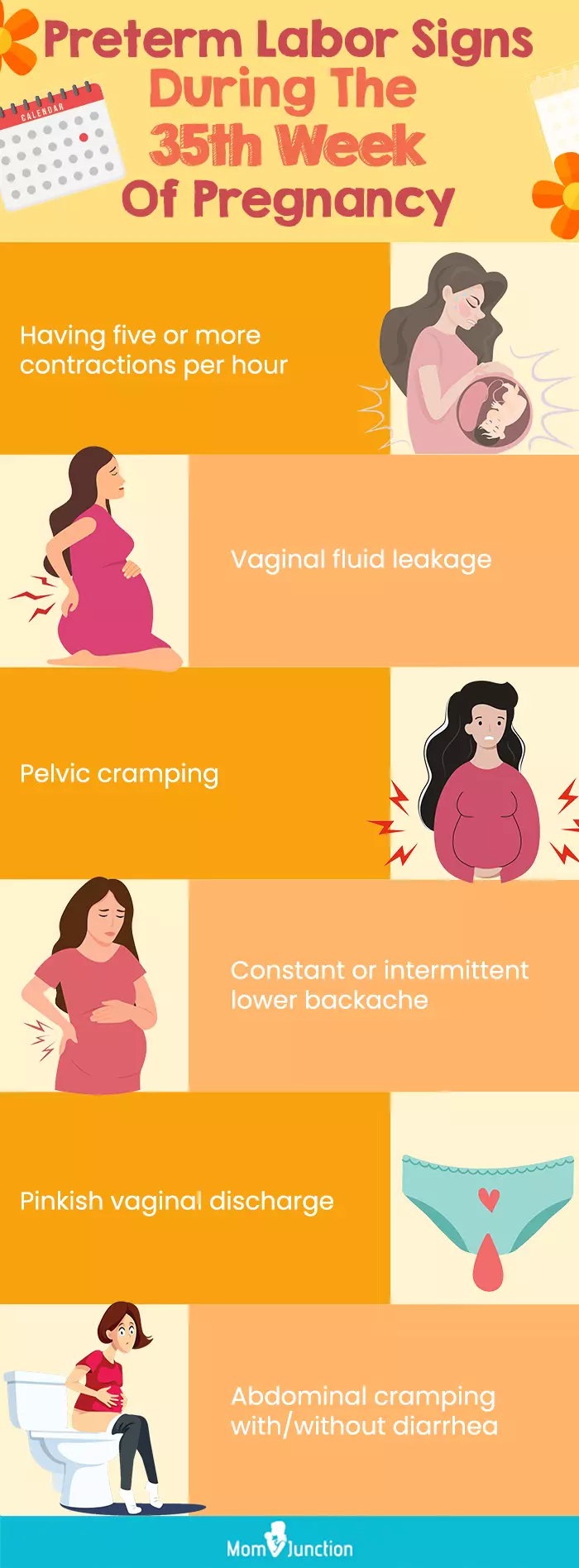
Illustration: Momjunction Design Team
Illustration: 35th Week Pregnancy: Symptoms Baby Development And Tips
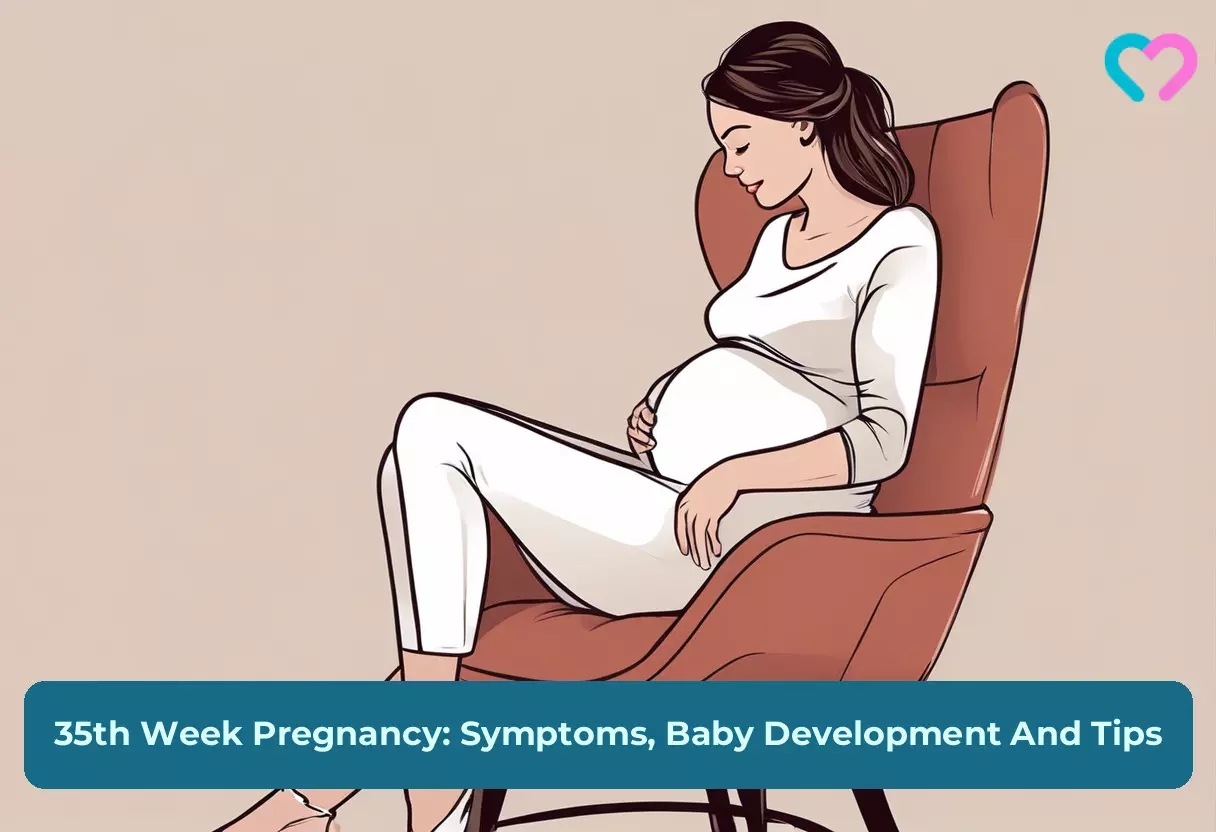
Image: Stable Diffusion/MomJunction Design Team
At 35 weeks pregnant your baby is changing positions and preparing for delivery that is soon to follow at any time in the coming weeks. Get tips and advice for healthy pregnancy and labor preparations with this video.
Personal Experience: Source
MomJunction articles include first-hand experiences to provide you with better insights through real-life narratives. Here are the sources of personal accounts referenced in this article.
i. Week 35: A little growth spurt?https://ashufik.wordpress.com/2015/03/23/week-35-a-little-growth-spurt/
References
- 35 weeks pregnant – all you need to know.
https://www.tommys.org/pregnancy-information/im-pregnant/pregnancy-week-by-week/35-weeks-pregnant - Fetal Development.
https://embryology.med.unsw.edu.au/embryology/index.php/Fetal_Development - Fetal development.
https://medlineplus.gov/ency/article/002398.htm - Your Baby Grows throughout Your Entire Pregnancy.
https://my.clevelandclinic.org/health/articles/7247-fetal-development-stages-of-growth - PREGNANCY WEEK BY WEEK.
https://www.duedatecalculator.org/pregnancy-week-by-week/ - Week 35.
https://kidshealth.org/en/parents/week35.html - PRETERM LABOR – KNOW THE SIGNS AND SYMPTOMS.
https://www.marshfieldclinic.org/specialties/obgyn/pregnancy/awareness/pregnancy-risk-preterm-labor - Prematurity.
https://www.stanfordchildrens.org/en/topic/default?id=prematurity-90-P02401 - Pregnancy Test (hCG).
https://www.testing.com/tests/pregnancy-test-hcg/ - Bonding with your baby during pregnancy.
https://www.pregnancybirthbaby.org.au/bonding-with-your-baby-during-pregnancy - Baby’s First Dreams: Sleep Cycles Of The Fetus.
https://www.sciencedaily.com/releases/2009/04/090413185734.htm - Neonatal care for the late preterm infant.
https://www.bidmc.org/-/media/files/beth-israel-org/centers-and-departments/neonatology/nicuadmission.pdf - Week-by-week guide to pregnancy.
https://www.nhs.uk/start-for-life/pregnancy/week-by-week-guide-to-pregnancy/3rd-trimester/week-35/ - 8 warning signs during pregnancy.
https://news.sanfordhealth.org/womens/warning-signs-pregnancy/ - Carpal Tunnel Syndrome and Pregnancy.
https://www.pregnancybirthbaby.org.au/carpal-tunnel-syndrome-and-pregnancy - Fetal Movement.
https://www.ncbi.nlm.nih.gov/books/NBK470566/
Community Experiences
Join the conversation and become a part of our nurturing community! Share your stories, experiences, and insights to connect with fellow parents.
Read full bio of Dr. Sangeeta Agrawal
Read full bio of shreeja pillai
Read full bio of Rebecca Malachi
Read full bio of Aneesha Amonz






